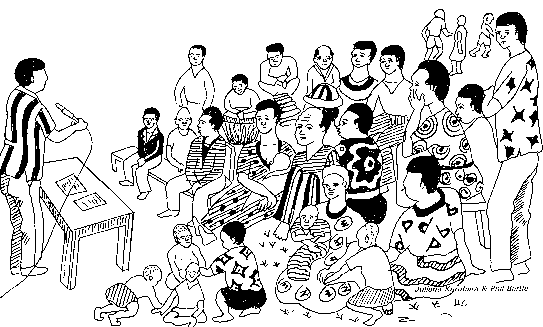Tweet
Translations:
'العربية / Al-ʿarabīyah
Català
中文 / Zhōngwén
Deutsch
English
Español
Filipino/Tagalog
Français
Ελληνικά / Elliniká
हिन्दी / hindī
Italiano
Português
Română
Српски / Srpski
Türkçe
اردو / Urdu
Other formats:
Other Pages:
Modules
Site Map
Key Words
Contact
Utility Documents
Useful Links
Contents:
Contents:
REPORT WRITING
for Coordinators and Managers of Community Programmes
by Phil Bartle, PhD
A Guide
Abstract:
This module is for coordinators of field workers, managers, administrators, planners, ministry officials, and local authorities responsible for programmes and people who are working to encourage and train low income communities to solve their own problems, to identify their own resources, and to plan their own development.
It asks the questions: "Why?" should reports be written, "to Whom?" do they go, and "What?" should be included, then goes on to discuss the "How?" they can be written well, so that they would be useful.
The tips and guidelines here were originally presented to field workers, with a view to assisting them in writing their own reports and in guiding and training community based organizations in writing project progress reports.
Coordinators can use these notes, to write their own reports, but also to train and supervise community field workers to write their progress reports.
Introduction:
- This document is aimed at coordinators, to:
- Write their own reports about their programme activities, and
- Assist field workers to write their progress reports.
- Another distinction to make is in the content of their reports. Although they can be combined, reports can include:
- Narrative progress reports (relating to programme objectives); and
- Financial reporting and accountability.
PART A: The "Why" of Report Writing:
Link to Part A: Why Write Reports?
While many of the reasons listed in this section were generated by field mobilizers in training workshops, they are surprisingly relevant to the manager at a desk in a district or national office, governmental or non governmental.
PART B: Who Should Receive Reports?
Link to Part B: Who should Receive Reports?
While the same benefits accrue as to reports written by field workers, a coordinator has a special focus on reporting to head quarters, to donors (including those who make ministry allocations), and as feedback to the field.
PART C: How to Write Reports:
Link to Part C: How to Write Reports.
The coordinator must receive and collate several progress reports from field workers in order to make a programme progress report. The emphasis is is on results related to programme objectives.
PART D: Writing Better Reports:
Link to Part D: Writing Better Reports.
Write reports that will be read; make them brief, concise, easy to read. A report that is not read has no purpose or effect. The tips offered to mobilizers apply also to coordinators.
Conclusion:
Report writing is an important task. It is essential for communication, which is necessary for maintaining transparency. The tips and guidelines here about writing reports are valuable to workers at all levels, from the field to headquarters.
Avoid the passive voice. Know your audience and the needs of your readers. Organize your reports by using an outline and by using subtitles. Write concisely (briefly but completely). Write in easy to read, simple language.
Good reports are extremely valuable; bad reports are those that are not read. Use these tips to improve your own report writing skills, and to train and supervise field workers.
––»«––
Monitoring the Mobilizing and Organizing:
 |